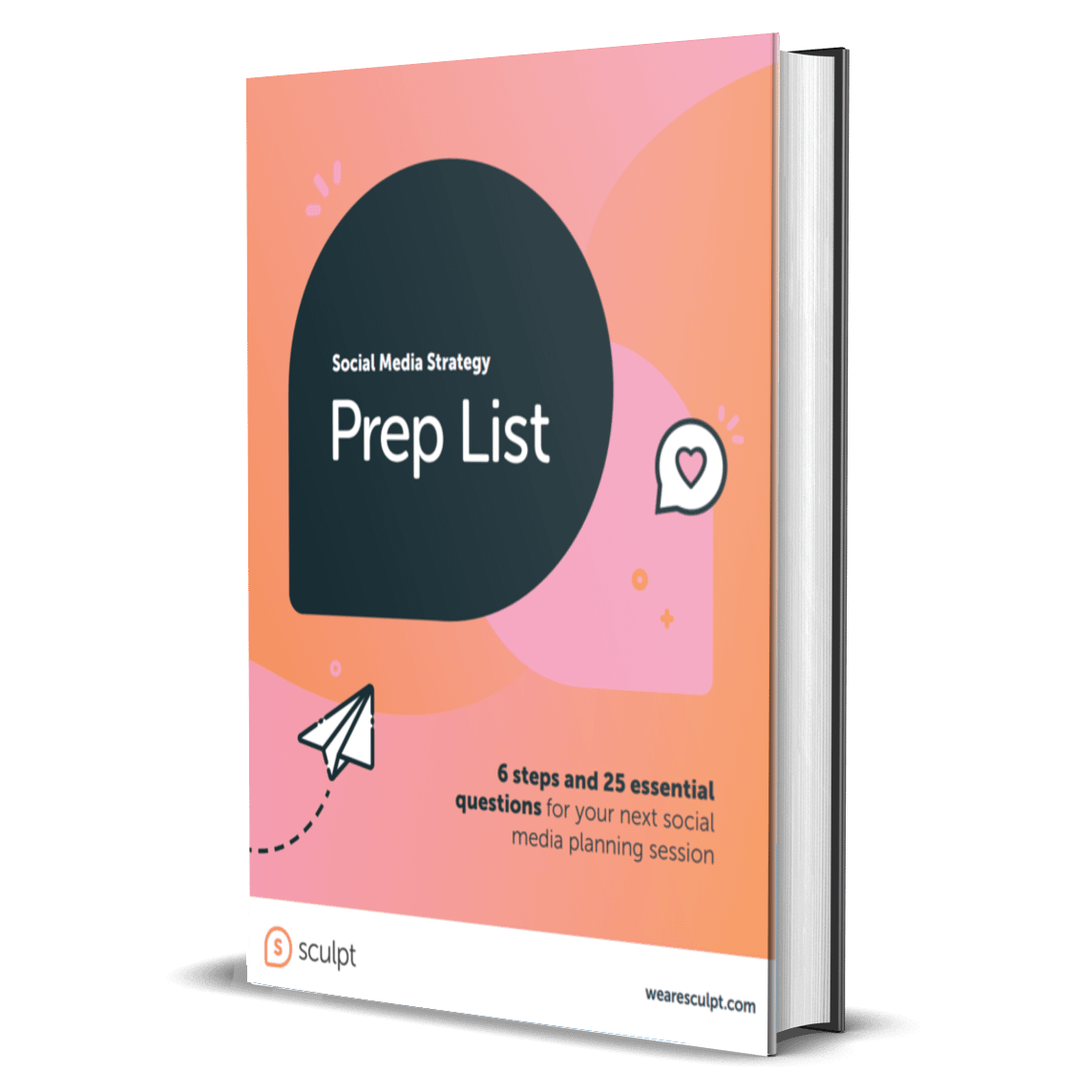Posted 10.12.2022 by Josh Krakauer
Six Social Media Discovery Questions We Ask Every Potential Client
These simple discovery questions tell us everything we need to know about how social fits into a brand’s big picture.
Am I the only one who gets giddy at the thought of discovery meetings?
Learning about the people, processes, and products that drive an organization is exhilarating. And while Sculpt would love to work with most brands we meet, the truth is, not all companies need our help.
In order to establish if we’ll be the perfect partner, we ask potential clients a series of insightful questions. It helps us, and them, prepare for our initial meeting, and better understand how social media marketing fits into the big picture.
These same social media discovery questions might be helpful for:
- Brand marketers who are considering working with a social media agency partner.
- Internal marketers who are looking to build better social media programs from within.
- Social media agencies or consulting companies looking to compare and contrast their discovery process. (Hey, no judgement here.)
The answers give clarity into your past and potential social media plan, including:
- Where should you focus first?
- What channels matter most?
- Where does social fit into an organization’s marketing priorities?
- How complex or aggressive will the social media marketing program be?
All of the things you need to know before onboarding.
Whether you’re marketing internally, or hiring external support, starting with D.I.S.C.O.V.ER. will get you on the right page faster.
Social media discovery questions should uncover:
- D: Brand Differentiation
- I: Current Infrastructure
- S: Social media past performance
- C: Customers and target audience
- O: Objectives for social media
- V: Vision for the brand
- E: Expectations for an agency partner
- R: Roles and Relationship of the agency
Note: The ordering of your social media questionnaire will vary. These project questions should be customized to your process.
1) Difference and positioning: What makes your brand different?
What it teaches us:
The story you will tell on social media platforms. Dig for the characteristics that differentiate you from your competition, and the brand associations your customers value most.
This informs your content strategy, paid campaign messaging, personality, and visual look/feel.
Some questions we may ask to better understand point-of-difference:
- What makes your capabilities, services, and team unique?
- What separates your product or service from direct competitors?
- Why do your clients (or customers, users, members) choose you?
- What are operational talk triggers do customers reference most often?
2) Current Initiatives on Social : What does your current social media marketing program look like? What platforms does your brand have a presence on?
What it teaches us:
Where you sit on the social brand roadmap. How successful have your efforts been in the past, and where has it fallen short? It also begins to get us thinking about what your social goals really should be.
This phase is one part audit, one part interview. The audit can uncover the historic posting frequency and consistency. The questions below should help make sense of competency and process.
- What content or tactics have worked, and what hasn’t?
- What experiments have you tried in the past year?
- How much are you spending per month on paid amplification?
- How are you tracking success on a monthly and quarterly basis?
- Do you have a Facebook pixel (and similar tracking tags) installed on your site?
- What’s the biggest obstacle to social media marketing growth with your current team?
3) Customers (and Audience): Who are your target audience segments and most valuable customers?
What it teaches us:
Once we agree on who we’re looking for (in your words), it becomes a whole lot easier to target your audience and plan content they’ll care about. Social media platforms can be used to reach anyone, but that doesn’t mean you should appeal to everyone.
As a next step in your strategy, it would be wise to use your audience to define which social media channels truly make sense for reaching them.
Some questions you can ask to better understand target audiences:
- What are the backgrounds, demo and geographic profiles of your target customers?
- What are their interests, online preferences, and purchase decision pain points?
- How do they research, evaluate, choose, and buy your product or service?
- What would they find funny, useful, beautiful, and inspiring?

[Bonus]: Smash your social media goals with the 6-step social media strategy prep list
Just in time for your next jam session, use our Social Media Marketing Strategy Prep List to make sure you’re aligning your goals, team, and content strategy to build an audience that cares, shares, and converts in 2021.
Includes the 25 essential social media marketing questions to ask.
4) Objectives: What are your specific, measurable goals for social media marketing?
What it teaches us:
The focus and measurement for your social media marketing.
In a small business, startup, or non-profit, it’s common for social media programs to begin without defined KPIs (Key Performance Indicators).
Conversations about what success “feels like” help us understand what to prioritize for success this year: organic awareness and audience growth, or customer acquisition?
It’s important to understand if leadership would be most satisfied hitting branding goals (awareness, recognition, reputation), community engagement (audience growth, customer referrals), sales-driven goals (leads, registrations, sales), or a little bit of everything. More often than not, the answer is the latter.
Some questions that can help define primary and secondary social media goals:
- A year from today, how would you measure your brand’s social media presence a “success?”
- What are your measurable goals for marketing, sales, and customer service?
- How would you define success for each social media channel?
5) Vision: Tell us about your brand’s vision?
What it teaches us:
Having your external team aligned with your internal vision is uber-important for long-term success. To get to Point B (2023) from Point A (2022), everyone needs first to understand Point C (the long game).
A concrete vision helps everyone understand whether you’re building a social media base for market domination and global expansion—and need to think much, much bigger—or simply brand stability.
Some questions you can ask to better understand long-term vision:
- Take us 10 and 3 years in the future: What does the brand and company look like?
- What does the future of your industry look like, and what role does your brand play in it?
- What else should be known about your growth plans?
6) Expectations of our Relationship: What are you looking for in a social media agency partner?
What it teaches us:
Setting expectations is the name of the game. An answer of, let’s say, “Go above and beyond what we’re capable of executing internally” or “Double our leads coming from social by EOY” helps articulate the true desire in a social media marketing partner. Nobody likes surprises or miscommunications.
Getting honest feedback at step zero puts the right combination of done-for-you (outsourced) and done-with-you (training) programs into perspective.
Some questions that can define how to structure an engagement:
- Are you looking for a long-term partner or short-term support?
- Which aspects of social would you like to own in the short-term? Long-term?
- Where would you most value outside support?
- What budget range are you able allocate to social (or this initiative) this year?
Of course, these questions might be the tip of the iceberg. A follow-up conversation can cover the market, industry, competitive landscape, company history, internal policy nuances, favorite colors, and other nitty gritty details on the product and organization. What questions are part of your discovery process?
Want a snapshot of the discovery questions Sculpt asks clients?
See our social media questionnaire below:
read this next
The Proven 6-Step Social Media Strategy Framework + Examples
